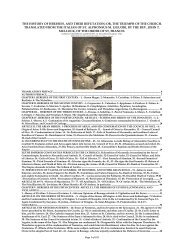The Writings of St. Francis of Assisi - + Saints' Works
The Writings of St. Francis of Assisi - + Saints' Works
The Writings of St. Francis of Assisi - + Saints' Works
Create successful ePaper yourself
Turn your PDF publications into a flip-book with our unique Google optimized e-Paper software.
THE WRITINGS OF ST. FRANCIS OF ASSISI<br />
<strong>The</strong> Life and Times <strong>of</strong> <strong>St</strong>. <strong>Francis</strong> <strong>of</strong> <strong>Assisi</strong><br />
by Pope Pius XI<br />
Excerpted from Rite Expiatis (April 13, 1926 A.D.), nn. 6-34.<br />
<strong>The</strong> terrible conditions existing in the times when <strong>St</strong>. <strong>Francis</strong> lived are well known to<br />
you, Venerable Brothers. It is quite true that then the faith was more deeply rooted in the people,<br />
as is proven by the holy enthusiasm with which not only pr<strong>of</strong>essional soldiers but even citizens<br />
<strong>of</strong> every class bore arms in Palestine to free the Holy Sepulcher. However, heresies gradually<br />
arose and grew in the vineyard <strong>of</strong> the Lord, propagated either by open heretics or by sly<br />
deceivers who, because they pr<strong>of</strong>essed a certain austerity <strong>of</strong> life and gave a false appearance <strong>of</strong><br />
virtue and piety, easily led weak and simple souls astray. <strong>The</strong>y went about, too, amid the<br />
multitudes spreading the destructive flames <strong>of</strong> rebellion. If some <strong>of</strong> these men, in their pride,<br />
believed themselves called by God to reform the Church to which they imputed the faults <strong>of</strong><br />
private persons, even going to the length <strong>of</strong> rebelling against the teachings and authority <strong>of</strong> the<br />
Holy See, later they openly manifested the real intention by which they were inspired. It is a<br />
notorious fact that before long the greater part <strong>of</strong> these heretics ended their careers in<br />
licentiousness and vice, and succeeded in embroiling the state in difficulties and in undermining<br />
the foundations <strong>of</strong> religion, <strong>of</strong> property, <strong>of</strong> the family, and <strong>of</strong> society. In a word, what happened<br />
then is precisely what we see recurring so <strong>of</strong>ten in the course <strong>of</strong> the centuries; rebellions leveled<br />
against the Church are followed or accompanied by rebellions against the state, the one receiving<br />
aid and comfort from the other.<br />
Although the Catholic faith still lived in the hearts <strong>of</strong> men, in some cases intact and in<br />
others a bit obscured, however lacking they might have been in the spirit <strong>of</strong> the gospels, the<br />
charity <strong>of</strong> Christ had become so weakened in human society as to appear to be almost extinct. To<br />
say nothing <strong>of</strong> the constant warfare carried on by the partisans <strong>of</strong> the Empire, on the one hand,<br />
and by those <strong>of</strong> the Church on the other, the cities <strong>of</strong> Italy were torn by internecine wars because<br />
one party desired to rule, refusing to recognize the rights <strong>of</strong> the barons to govern, or because the<br />
strong wished to force the weak to submit to them, or because <strong>of</strong> the struggles for supremacy<br />
between political parties in the same city. Horrible massacres, conflagrations, devastation and<br />
pillage, exile, confiscation <strong>of</strong> property and estates were the bitter fruits <strong>of</strong> these struggles.<br />
Sad indeed was the fate <strong>of</strong> the common people, while between lords and vassals, between<br />
the greater and the lesser, as they were called, between the owners <strong>of</strong> land and the peasants<br />
existed relations in every sense <strong>of</strong> the world foreign to the spirit <strong>of</strong> humanity. Peace-loving<br />
people were harassed and oppressed with impunity by the powerful. Those who did not belong to<br />
that most unfortunate class <strong>of</strong> human beings, the proletariat, allowed themselves to be overcome<br />
by egotism and greed for possessions and were driven by an insatiable desire for riches. <strong>The</strong>se<br />
men, regardless <strong>of</strong> the laws which had been promulgated in many places against vice,<br />
ostentatiously paraded their riches in a wild orgy <strong>of</strong> clothes, banquets, and feasts <strong>of</strong> every kind.<br />
<strong>The</strong>y looked on poverty and the poor as something vile. <strong>The</strong>y abhorred from the depths <strong>of</strong> their<br />
souls the lepers—leprosy was then very widespread—and neglected these outcasts completely in<br />
their segregation from society. What is worse, this greed for wealth and pleasure was not even<br />
absent, though many <strong>of</strong> the clergy are to be commended for the austerity <strong>of</strong> their lives, from<br />
those who should have most scrupulously guarded themselves from such sin. <strong>The</strong> custom, too,<br />
was prevalent <strong>of</strong> monopolizing wealth and piling up large fortunes. <strong>The</strong>se fortunes were <strong>of</strong>ten<br />
acquired in divers and sinful manners, sometimes by the violent extortion <strong>of</strong> money and other<br />
Page - 7













